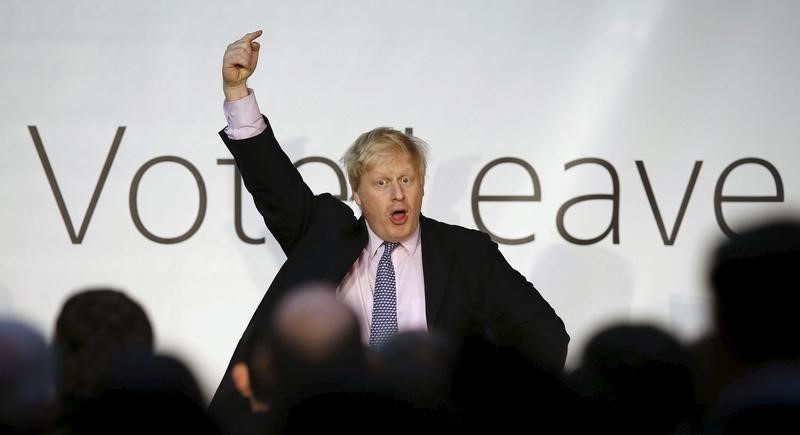By Paul Taylor
BRUSSELS (Reuters) - As a former journalist who made his name by bashing Brussels but was sometimes accused of twisting the facts, Boris Johnson knows there's no easier way to hook readers than to lead with Hitler.
Yet his attempt to blacken the European Union by associating its limited, negotiated supranational powers with attempts by the Nazi German leader or the French Emperor Napoleon to impose their rule on the continent by force was politically perilous.
For one thing, it disregarded the strategic vision of two of his own Conservative heroes, Winston Churchill and Margaret Thatcher, both of whom saw a more united Europe as the answer to Hitlerism, and a way to ensure peace and stability after centuries of bloodshed.
The former mayor of London is not just distorting history - the EU's 28 democracies freely assented to pooling some of their sovereignty, even creating a voluntary exit clause which Johnson is now urging Britons to use.
His Hitler jibe may backfire on the "Leave" campaign in Britain's June 23 referendum on EU membership and derail his ambitions to replace David Cameron as prime minister.
Even Britons who distrust the EU and feel, like many Europeans, that its actions are not sufficiently subject to democratic control are unlikely to equate it with jackbooting dictators or the Holocaust by other means.
Latest opinion polls suggest wavering Conservative supporters are shifting towards voting to remain in the EU when the island nation faces its geopolitical choice next month.
In an interview with the Sunday Telegraph, Johnson said the EU was doomed to fail like all attempts to create a "golden age of peace and prosperity" since the Roman Empire 2,000 years ago.
"Napoleon, Hitler, various people tried this out, and it ends tragically," he said.
"DEMOCRATIC VOID"
"The EU is an attempt to do this by different methods. But fundamentally what is lacking is the eternal problem, which is that there is no underlying loyalty to the idea of Europe. There is no single authority that anybody respects or understands. That is causing this massive democratic void."
Johnson also blames Brussels, rather than President Vladimir Putin, for Russia's 2014 annexation of Crimea and the success of armed Russian-speaking separatists in eastern Ukraine.
"If you want an example of EU foreign policy-making on the hoof, and of the EU's pretensions to running a defence policy that have caused real trouble, then look at what has happened in Ukraine," he told a news conference on May 9.
As the author of a biography of Churchill, as well as a book on the Roman Empire, Johnson must know that his favourite statesman passionately advocated a united Europe after World War Two to prevent any return to nationalism and warmongering.
In his celebrated 1946 Zurich speech, Churchill said the remedy was "to re-create the European family, or as much of it as we can, and to provide it with a structure under which it can dwell in peace, in safety and in freedom. We must build a kind of United States of Europe."
Although he did not envisage Britain joining such a body due to its empire, Churchill was a founding father of the Council of Europe, which established the European Convention on Human Rights and the multinational court that upholds it.
Yet many of today's Conservatives want to withdraw from that convention - ratified by all European nations except Belarus, and including Russia - which they see as an unacceptable intrusion into the sovereignty of the British courts.
"PEACE AND SECURITY"
Even more striking is the contrast between Johnson's view of the lessons of European history and Thatcher's.
In a speech launching the Conservative "Yes" campaign in Britain's 1975 referendum on whether to stay in the European Economic Community - the forerunner of the EU - she drew a direct link between European integration and peace.
Thatcher expressed gratitude that her children had not been embroiled in a European conflict as were the children of the previous two generations. "The Community gives us peace and security in a free society, a peace and security denied to the past two generations," she said.
For pragmatic post-war Conservatives, it was clear that the policy Britain had pursued since the 16th century - of trying to maintain a balance of power on the continent - had failed to avert two world wars, with disastrous consequences.
The strategic lesson drawn by Churchill and his successors was that Britain must be actively engaged in building not only the NATO military alliance but also a united Europe, and not be tempted by isolationism or appeasing expansionary powers.
Johnson's view of Britain's place in Europe seems closer to the long-running BBC comedy series "Dad's Army", which mocked a Home Guard of elderly part-time soldiers preparing valiantly to defend the island against a Nazi invasion that never came.
The sitcom's theme tune began: "Who do you think you are kidding, Mr Hitler, if you think we're on the run?"

That question might well be addressed to Boris Johnson.